EHESS-UMIFRE Workshop
This doctoral programme will consist of four 2-3 hour workshops over two days, each focusing on a dialogue and joint readings.
Date: May 12-14, 2025
Location: CEFRES, Na Florenci 3, Prague 1
Language of the workshop: English, French
Organizers : EHESS, CEFRES (Prague), CRFJ (Jerusalem), IFA SHS (Frankfurt/Main)
Coordination : Falk Bretschneider (EHESS / IFRA-SHS) & Mateusz Chmurski (Sorbonne Université / CEFRES)
Argumentary:
How do we name the things that happen? If this question is always relevant, it is never as sensitive, divisive, or necessary as it becomes in times of crisis. The Russian invasion of Ukraine, followed by the crisis in the Near East that erupted on October 7, 2023—with their respective share of daily tragedies—give this question a cruel and painful urgency. How do we name what is happening to us? Pogrom. Resistance. Colonisation. Terrorism. Genocide. Segregation. Apartheid. War crimes. How do we choose these words, and who chooses them for us? Are these words precise enough to fairly capture reality, while broad enough not to be reduced to the empirical description of isolated events? If imprecision is a necessary attribute of language, how can we be sure that the intentions behind these words are free from manipulation, harmful visions, or dangerous ideologies? To which frameworks—legal, legislative, expert, academic—do these words belong? What do they permit, and what do they silence? How do they mobilise reason, emotion, moral judgement, or ethical and political positions? In what historical contexts were these words created or imbued with meaning, and how much would it cost to free them from those contexts? Indeed, to question, clarify, and correct the words we use as categories to analyse the world as it is—this is no easy task.
Program
Monday 12th May
19:00 Welcome dinner
Tuesday 13th May
10:00-13:00 Masterclass 1
Veronika Duma (Goethe-University Francfort) In English
Veronika Duma, who works at the Chair of Holocaust History at Goethe University, proposes to speak on the notion of ‘genocide’. There has again been a notable rise in antisemitism. The current debate about the concept of antisemitism, which is highly politicized, is characterized by two different definitions. To elaborate more on the term antisemitism, its historical and political dimensions will be discussed. The examination will trace the origins of the term back to the late 19th century, analyzing its historical development.
13:00-14:00 Lunch (catering)
14:00-18:00 Master class 2
François-Xavier Fauvelle (CRFJ) In French
François-Xavier Fauvelle, historien de l’Afrique, Professeur au Collège de France, directeur du CRFJ à Jérusalem depuis septembre 2023, viendra pointer et interroger les références africaines (colonisation, apartheid, génocides des Hereros et des Tutsi) qui sont couramment employées par les analystes du Proche-Orient. Il essaiera également d’exprimer ce que veut dire, pour lui, de vivre sous le feu de l’événement, comment ses carnets de guerre sont devenus un commentaire du commentaire de l’actualité en même temps qu’un enregistrement de ses recherches, et comment il a observé, à son corps défendant, que l’exigence d’exactitude impose, peut-être paradoxalement, le silence.
19:00 Dinner
Wednesday 14th May
10:00-13:00 Master class 3
Valeria Korablyova (Charles University / CEFRES) In English
Valeria Korablyova will analyse the concept of sovereignty: how it is challenged and re-interpreted in an increasingly turbulent world of today. There are good texts to discuss in the context: from Stephen Krasner’s « Sovereignty: Organized Hypocrisy » to Carl Schmitt and Surkov’s « sovereign democracy ». I believe that rivaling renderings of sovereignty will define the world-to-come: whether people/nations (democratic imaginary) or the leaders (populist and autocratic imagineries) are the true sovereigns; and how domestic sovereignty correlates with transnational institutions and international legitimacy; the EU’s concept of « shared sovereignty »; how sovereignty relates to freedom and responsibility; isolationism vs expansionism, etc.
13:00-14:00 Lunch (catering)
14:00-17:00 Master class 4
Rainer Maria Kiesow (École des hautes études en sciences sociales) In French
Rainer Maria Kiesow, professeur de droit, directeur d’études à l’École des hautes études en sciences sociales (EHESS) à Paris, discutera la notion de « génocide » dans ses multiples dimensions historiques, juridiques, politiques. Dans un second temps, il parlera des réactions au 7 octobre 2023 et des raisons de la « haine » (Eva Illouz) qu’on peut y voir et qui est, de part et d’autre, qualifié comme expression d’un « antisémitisme » de gauche.
18:00 Closure / dinner

